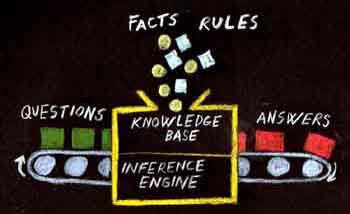|
||
|
First of all - where do facts and
rules come from? Facts and rules come from a knowledge engineer (KE for
short), who either is an expert in the area of interest, or someone who has access to
such an expert. The KE formulates the knowledge so that Pro/3
can make use of it in a way that makes the system produce something
useful. This means that he or she also needs to know Pro/3 - its knowledge
representation concepts, its inference methods and the tools included in the system.
You cannot understand Pro/3 rules unless you understand Pro/3 facts (sentences).
|
||
| Pro/3 supports two very different types of rules - sentence rules and rules for inexact reasoning. These two types differ in most respects: structure, usage and purpose; and they are handled by two different inference engines. Sentence rules belong to the realm of crisp knowledge and are processed by a PROLOG-type inference engine (Pro/3's main inference engine). Rules for inexact reasoning belong to the realm of fuzzy logic, and are processed by a simpler inference engine called up by, but also making use of the main engine. | ||
| Facts in Pro/3 are called sentences, and a sentence rule describes how sentences are derived from other sentences. A sentence rule has an if condition(s) then conclusion-structure, where the conclusion always is a sentence-like structure - a form of template for sentences which can be concluded from the condition(s). The condition in almost all cases, include one or more sentence-like structures, but it also can include other elements i.e. conditions involving simple variables including function calls. There are two main classes of sentence rules: simple rules and set rules. | ||
| Rules for inexact reasoning include rules for deriving certainty factors (certainty rules) and rules for working with fuzzy sets (fuzzy set membership). |
